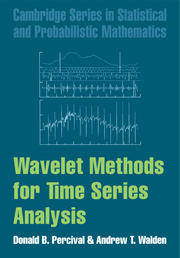Book contents
- Frontmatter
- Contents
- Preface
- Conventions and Notation
- 1 Introduction to Wavelets
- 2 Review of Fourier Theory and Filters
- 3 Orthonormal Transforms of Time Series
- 4 The Discrete Wavelet Transform
- 5 The Maximal Overlap Discrete WaveletTransform
- 6 The Discrete Wavelet Packet Transform
- 7 Random Variables and StochasticProcesses
- 8 The Wavelet Variance
- 9 Analysis and Synthesis of Long MemoryProcesses
- 10 Wavelet-Based Signal Estimation
- 11 Wavelet Analysis of Finite EnergySignals
- Appendix. Answers to Embedded Exercises
- References
- Author Index
- Subject Index
8 - The Wavelet Variance
Published online by Cambridge University Press: 05 December 2013
- Frontmatter
- Contents
- Preface
- Conventions and Notation
- 1 Introduction to Wavelets
- 2 Review of Fourier Theory and Filters
- 3 Orthonormal Transforms of Time Series
- 4 The Discrete Wavelet Transform
- 5 The Maximal Overlap Discrete WaveletTransform
- 6 The Discrete Wavelet Packet Transform
- 7 Random Variables and StochasticProcesses
- 8 The Wavelet Variance
- 9 Analysis and Synthesis of Long MemoryProcesses
- 10 Wavelet-Based Signal Estimation
- 11 Wavelet Analysis of Finite EnergySignals
- Appendix. Answers to Embedded Exercises
- References
- Author Index
- Subject Index
Summary
Introduction
As we saw in Chapters 4 and 5, one important use for the discrete wavelet transform (DWT) and its variant, the maximal overlap DWT (MODWT), is to decompose the sample variance of a time series on a scale-by-scale basis. In this chapter we explore wavelet-based analysis of variance (ANOVA) in more depth by defining a theoretical quantity known as the wavelet variance (sometimes called the wavelet spectrum). This theoretical variance can be readily estimated based upon the DWT or MODWT and has been successfully used in a number of applications; see, for example, Gamage (1990), Bradshaw and Spies (1992), Flandrin (1992), Gao and Li (1993), Hudgins et al. (1993), Kumar and Foufoula-Georgiou (1993, 1997), Tewfik et al. (1993), Wornell (1993), Scargle (1997), Torrence and Compo (1998) and Carmona et al. (1998). The definition for the wavelet variance and rationales for considering it are given in Section 8.1, after which we discuss a few of its basic properties in Section 8.2. We consider in Section 8.3 how to estimate the wavelet variance given a time series that can be regarded as a realization of a portion of length N of a stochastic process with stationary backward differences. We investigate the large sample statistical properties of wavelet variance estimators and discuss methods for determining an approximate confidence interval for the true wavelet variance based upon the estimated wavelet variance (Section 8.4).
- Type
- Chapter
- Information
- Wavelet Methods for Time Series Analysis , pp. 295 - 339Publisher: Cambridge University PressPrint publication year: 2000

